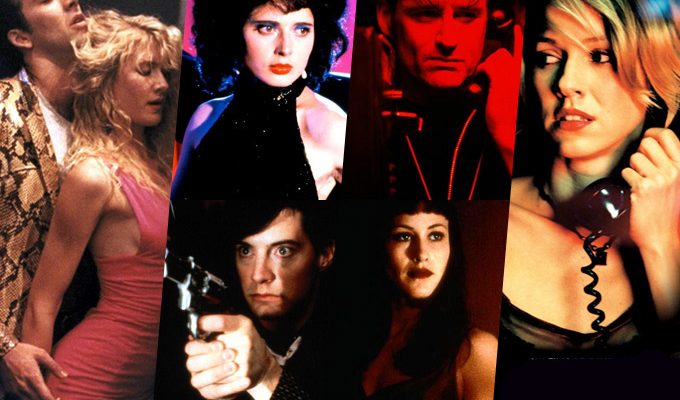
“Wild at Heart” (1990)
A furious shot through the heart, brimming with movie-movieness and gleeful perversion, “Wild at Heart” sees the director perhaps having the most fun he’s ever had making a movie. The film also sees Lynch, not surprisingly, at his most romantic. Granted, Mr. Lynch’s version of romance involves murderous in-laws, a lot of dead bodies and scenes of awful violence juxtaposed with the melodies of Elvis Presley. But the campy, hot-and-heavy mood of “Wild at Heart” is just window dressing: in Lynch’s mind, the movie’s two star-crossed lovers truly do care for one another, and are willing to outrun any son of a bitch who might think about putting a stop to their passionate rendezvous. Nicolas Cage turns in one of his brilliantly hammy 90’s turns as Sailor Ripley, a savage, oversexed bad boy who seems to have borrowed his greaser outfits and permanent sneer from his hero, Mr. Presley. Laura Dern, the director’s longtime collaborator and friend, plays Lula, a young woman fueled by insatiable lust who longs to flee with Sailor far from the reaches of her terrible, tyrannical family Along their corpse-littered trek through the rotten roads of Americana, (it must be said too, that while “Wild at Heart” is superficially similar to Oliver Stone’s “Natural Born Killers,” it’s ultimately a less self-conscious and more focused film) our two lovers encounter seedy cowboy types, rocket scientists, John Lurie and a sadistic assassin named Bobby Peru. Peru, played by the great Willem Dafoe with rotting teeth and the pencil mustache of a silent movie actor, is a creepy, hilarious turn: undeniable evidence that Lynch knows how to get great work out of actors. To be sure, “Wild at Heart” is rough and nasty and doesn’t play nice, and those expecting restraint or a conventional narrative might want to look elsewhere. But for those who are curious as to what David Lynch’s vision of young love might look like, look no further: “Wild at Heart” is just that, plus weird on top.

“Twin Peaks: Fire Walk With Me” (1992)
The sleepy, entirely fictional Washington town of Twin Peaks appears to haunt Lynch: nearly 30 years after it first appeared on screen, he’s returning there in 2017 for a new Showtime TV series, currently filming the long-awaited successor to the original series. And back in ’92 soon after the show was cancelled, Lynch took the show to the big screen for prequel “Fire Walk With Me.” The result was hugely divisive: to some (and increasing number nowadays it seems), it’s one of Lynch’s best, to others, like those who booed and panned it at Cannes, his worst (after seeing it at Cannes Quentin Tarantino said “David Lynch had disappeared so far up his own ass that I have no desire to see another David Lynch movie until I hear something different. And I loved him. I loved him”). Announced barely a month after the series was cancelled (and that itself after a second season which had been poorly received by fans and featured less involvement from Lynch and co-creator Mark Frost) it reunited most of the show’s cast, and a few new additions — Moira Kelly (stepping in for Lara Flynn Boyle), Chris Isaak, Kiefer Sutherland, David Bowie — to tell the story of the investigation of the murder of Teresa Banks, and the final living days of Laura Palmer (Sheryl Lee). As a continuation of the show for those who were most interested in its mysteries, it’s probably not very satisfying — Agent Cooper’s barely involved, the mythology of Bob is expanded but not by much. You can sometimes feel the strain on the movie, trying to tick all the right boxes and include the right people, and the opening section with Isaak and Sutherland is a disappointment. But as a sad, deeply weird riff on Lynch’s self-created Twin Peaks universe the film’s a triumph, adding real tragedy to a character who might have been the show’s most iconic, despite being dead when it began.

“Lost Highway” (1997)
In a career full of confounding and inscrutable moments – juxtaposing Roy Orbison with ghoulish violence in “Blue Velvet,” the infamous dumpster monster from “Mulholland Drive,” all of “Inland Empire” – “Lost Highway” stands as a whopping 134 minutes of just that: relentless inscrutability. Its evocation of a shadowy Los Angeles borne from the minds of noir writers like Raymond Chandler and Dashiell Hammett is potent, and Lynch’s preference for dream logic takes on a seductive horror-movie tinge here. But “Lost Highway” never really comes together as a story, and more importantly, it never, not once, makes a lick of goddamn sense. The story of one man’s identity split nastily in two is reflected in the film’s bifurcated story structure. It’s a bold move by the director, but unfortunately as the teasing, moody menace of the film’s first half eventually dissolves into head-scratching histrionics of the second, for once Lynch has not given us enough reason to care about puzzling it out. Bill Pullman plays Fred Madison, a tortured jazz musician whose wife (Patricia Arquette) is constantly elsewhere, even when they’re making love. A series of sinister coincidences then unfurls, including a premonition courtesy of a pasty-faced ghoul at a Hollywood party (this scene, featuring a terrifying turn from accused murderer and former “Bonanza” star Robert Blake, is the film’s highlight, and one of the most blood-curdling things Lynch ever put on film) along with some increasingly brutal video tapes that showcase footage of Fred’s home in the Hollywood Hills. It’s clear enough “Lost Highway” is punch-drunk on atmosphere and dread, but it’s curiously light on some of the other factors that have made Lynch’s work so memorable in the past. It’s an off-putting, stilted film that occasionally gets under the skin, but too often lacks the full-bore commitment of something like “Mulholland Drive” or “Eraserhead”. It’s a fascinating film to revisit, however and constantly plays in different registers upon each new viewing.

